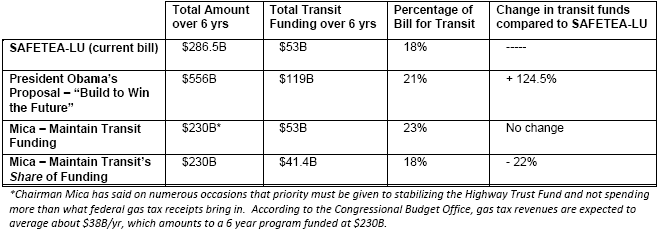
Update 3:35 p.m.: Transportation Committee staff says Mica has confirmed what he meant: "He was referring to the share. Keep in mind that we have no numbers or details for a bill yet -- the hearing process is not yet finished and we have not drafted a bill. He was simply speculating at this point."
Using the chart above as a guide, keeping transit's share of funding (rather than the absolute number) is bad news if the bill is smaller than the last one. If the committee keeps spending to current Highway Trust Fund levels, that would mean a smaller bill and less for transit.
He didn’t say it in front of several hundred transit officials, and he didn’t say it afterward when questioned by a gaggle of reporters. But the Wall Street Journal reported Transportation Committee Chair John Mica told a reporter at last week’s American Public Transportation Association conference, “I think [public transportation funding]’s going to have to stay about the same."

Mica has been unwilling to talk numbers with other reporters (including this one) and has said again and again that he doesn’t have a bill written. He has said he wants a big bill, and he supported Jim Oberstar’s $450 billion transportation plan in 2009. But his committee’s official response to the president’s budget tells another story, one that puts the Journal quote: With the Highway Trust Fund nearing insolvency, no viable plans to replenish it, no allowance for infusions from the general fund, and no chance of passing a bill that’s not explicitly paid for, the clear result would be flat – or reduced – transportation spending.
This scenario, however, doesn't take into consideration the economic benefits of transportation investments. Spending for infrastructure isn't just "spending" -- it creates jobs and (ahem) paves the way for economic growth. Futuristic subways in Asia and bus rapid transit systems in Latin America are leaving the U.S. behind, and that's not lost on concerned U.S. politicians and economists. Modern, efficient transportation infrastructure is an engine for economic growth. And growth is a far better mechanism for drawing down the deficit than reckless cutting that hamstrings the country's competitiveness for years to come.
We’re trying to confirm that Mica is, in fact, expecting flat transit funding and trying to clarify exactly what he meant. As Ya-Ting Liu of the Tri-State Transportation Campaign wrote in Mobilizing the Region, it depends what the meaning of "about the same" is:
Does he mean that transit’s share of federal transportation funding will stay the same, or that the actual dollar amount dedicated to transit will stay the same? These two scenarios have very different implications for transit, especially with a smaller transportation bill.
I’ve asked Mica about the highway/transit ratio, which has historically been 80/20 but which the president wants to bump to something more like 74/26. He hasn’t had an answer on that.
Ya-Ting also astutely points out that “more than 84% of transit agencies across the country have already consolidated their operations over the past couple of years — that is, by cutting service, with devastating impacts to the transit riding public.” The constant directive from Capitol Hill to “do more with less” raises the hackles of local transportation officials, who have noted that they tend to “do less with less.”
We’ll fill you in when we hear more details from Mica’s office.





